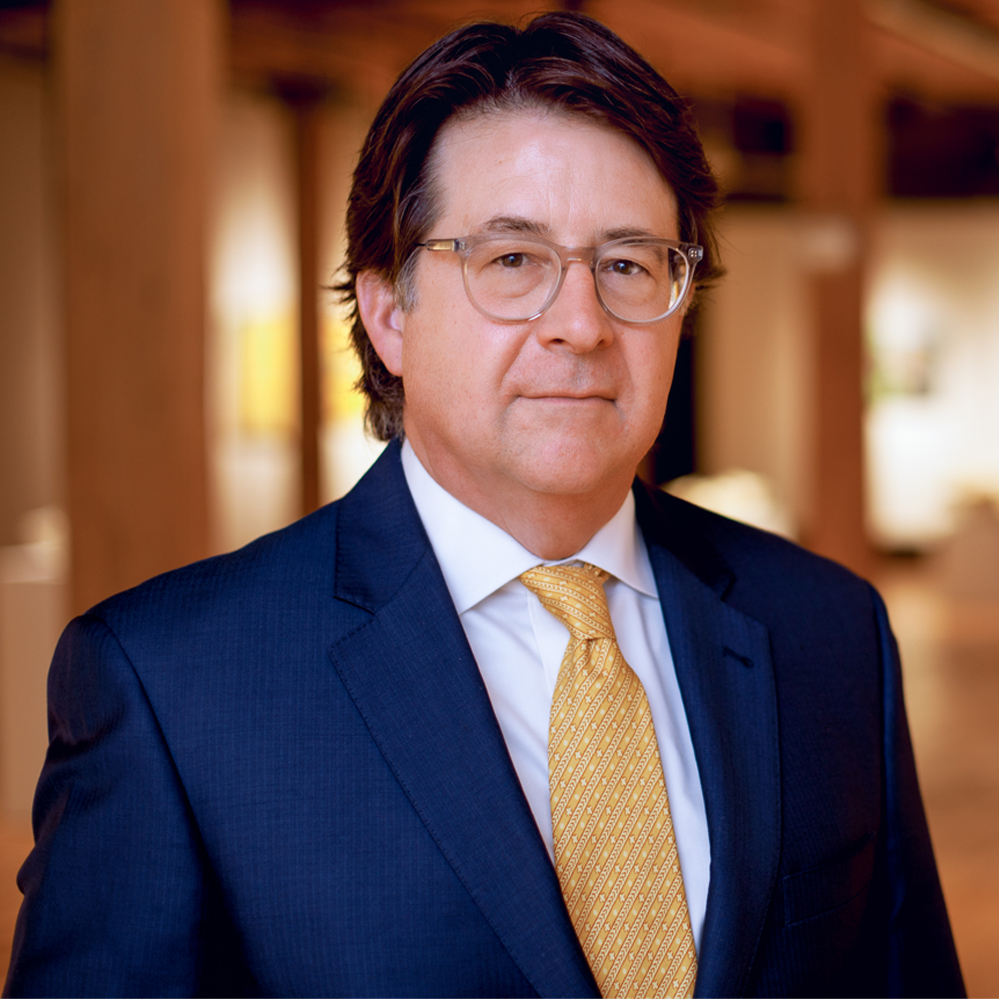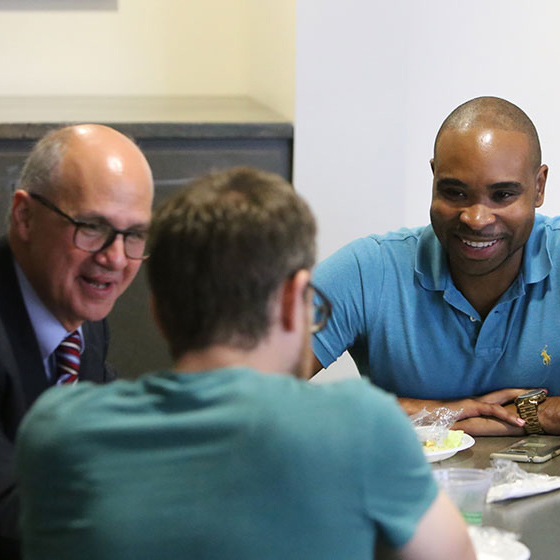FACULTY PROFILE Dean Strang
The defender
Renowned criminal defense lawyer Dean Strang joins Loyola’s faculty
Dean Strang never planned to become a lawyer – he wanted to be an editorial cartoonist. But during his undergrad years, he thought he should pursue a more practical profession. Taking a cue from his aunt Eileen, a “blisteringly smart” and trailblazing lawyer he had long admired, Strang enrolled in law school in 1982. After stints in employee benefits litigation work, he found himself practicing criminal law—including a run as Wisconsin’s first federal defender. In 2006, Strang began representing Steven Avery, a Wisconsin man accused of murder in a case that received worldwide attention after the 2015 release of the Netflix documentary Making a Murderer. Here, the School of Law’s distinguished professor in residence discusses his most important lessons, what needs to change in the criminal justice system, and why he’s optimistic about the next generation of law leaders.
What is the most important thing you learned from working on Steven Avery’s case?
It was one of the only cases I’ve had in which I was convinced that law enforcement planted essential pieces of evidence. It’s much more common to have questions about whether the police lawfully seized something than to have real questions about whether the police themselves created or placed the evidence they claim to have found. And that’s a tough defense to have to make, particularly in a rural area. … The police institutionally, as a whole, tend to be respected and not suspected of that kind of gross misconduct.
And I’m the grandson of a police officer. After my own parents, he’s probably the most significant contributor to my own formation as a person. I had to grapple with a duty to the truth as I believed it to be, and a duty to a client to say, “We can’t trust the police here. We can’t trust the evidence they say they found.” I had to balance that with a whole lot of reluctance as a practical matter and as a personal matter to make that argument and to present that evidence. That was a learning experience and a reminder of how important it is to try to take yourself out of a case … to make it about your client and what kind of society we want to live in.
“All of us are so steeped in the idea of punitive response as an answer to fears, an answer to social disruptions, an answer to violence, and an answer to drug and alcohol problems.”
What do you think needs to change in the legal and criminal justice systems?
All of us are so steeped in the idea of punitive response as an answer to fears, an answer to social disruptions, an answer to violence, and an answer to drug and alcohol problems. We’re so steeped in it that we don’t even see it. We can’t break out of it because we’re not aware of just how enmeshed in it we are. So rethinking whether punishment is something that makes sense—and to what extent it makes sense—is an important first step in this.
Recognizing that the institutions of state power, whether they’re the police, the courts, the corrections departments, probation, and parole—I’m not talking about the military at the moment—all of them exist and always have existed predominantly to control pretty narrow subsets of our population and to control them repressively. We are beginning to awaken to that and willing to talk about it. That there are deep structural inequities in how these institutions work, and indeed how they’re designed to work, is an important emerging or coalescing point of recognition, I think. It allows us to then begin to talk about, what do we want to do differently?
I think we’re seeing a broader awareness of how pervasive mental health problems are—and I include drug and alcohol abuse in that—and how ill‑suited the tools of criminal justice and corrections are in actually fixing those problems rather than making them worse. I see a number of areas in which there seems to be a coalescing awareness or willingness to hear and listen, that I wouldn’t have seen present five years ago.
Do you think there have been improvements in the criminal justice system over the last few years?
The last five years have seen a broad awakening of engagement with questions of systemic injustice. And embraced within the idea of systemic injustice are deep inequalities in the way race affects people’s experience, ethnicity affects people’s experience, recent arrival as an immigrant affects people’s experience, class as an overarching factor affects the experience of people with our government institutions—including those that immodestly and inaccurately claim to be a criminal justice system.
I think that media—both the traditional media and social media—have had a significant pull in this broader engagement that I sense is spreading rapidly. The impact of social media is obvious because people now can connect in France, Algeria, Canada—wherever—and share common concerns or detect common patterns in inequality and injustice. All of this, at least, has coincided with a rising level of interest in the true-crime genre, which is cyclical. I have sensed it on stages, at lecterns, by the way an audience engages in individual cases or in the minutiae of police process, investigative process, court rules, rules of appellate courts.
Regarding the guilty verdict for your client Steven Avery, you were quoted in the media as being disappointed, understandably, and that you had “that feeling of failure and inadequacy that never goes away.” Do you still feel that way?
Yes, and probably more. Part of my experience in the last five years has been meeting, hearing from, and reading the work of people who’ve been more engaged, for longer, with all of these problems than I have. In some ways, as a practicing lawyer, you are a creature of the clients you have right now—their immediate problems. And you have to be oriented toward that. We’re in the business of personal service—not trying to fix the world but trying to help one person fix their life or have their life not come completely undone. But it gives you a very microscopic focus. [Regarding] why I feel more inadequate and more the sense of failure? It’s just as I recognize the breadth of possible engagement and the obligation to try to engage more broadly, I’m ever more acutely aware of my human limitations.
What are your greatest strengths as a lawyer?
I’m a pretty good writer in the world of practicing lawyers. I’m a relatively creative thinker about how to approach practical but recurrent problems that you actually see in the practice of law—how to attack those in a new or creative way. I do well with clients as a rule; I rarely end up with a broken relationship with a client. I really treasure clients as people who’ve got usually much more to offer the world than they’ve been given credit for having.
What about as a professor? What do you think are the greatest strengths you bring into the classroom?
Curiosity, a commitment to learn myself and to share the project of learning with students, and to try to be a collaborator and a companion in the project of learning. Genuine enthusiasm for addressing the shortcomings of our legal system, for exposing and trying to change or at least help position students to change, over time, the inanities and falsities of legal doctrine. And I like students. I like people who are engaged in the project of learning—they want to be something more tomorrow than they perceive themselves as being today, and I find that hugely appealing.
What would you say to students who want to come to law school or are coming to law school, but they’re not exactly sure what they want to focus on? What might you tell them?
Good for you. That was me. In fact, not only did I not know what I wanted to focus on—I did know what I didn’t want to focus on, which was anything having anything to do with criminal law. And here I am, 35 years later. That’s part of the magic of education, that you maybe go in not knowing what you want, or having an idea about what you want, and end up in a very, very different place—and glad for the journey that got you there.
Don’t get me wrong … it’s wonderful to see people come in on fire about something—like intellectual property … or antitrust law, or whatever it might be—but it’s not essential. There’s lots of room to explore. I was that student, and I’m here to tell you that I don’t regret a bit coming into law school uncertain of what I wanted to do three years later with a law degree. It’s enough that the drive to go to law school is focused on the beginning date, on your first day of law school. And if you’re enthusiastic about the possibilities of studying law, you can find something that will allow you to lead a meaningful life. –Kristi Turnbaugh

